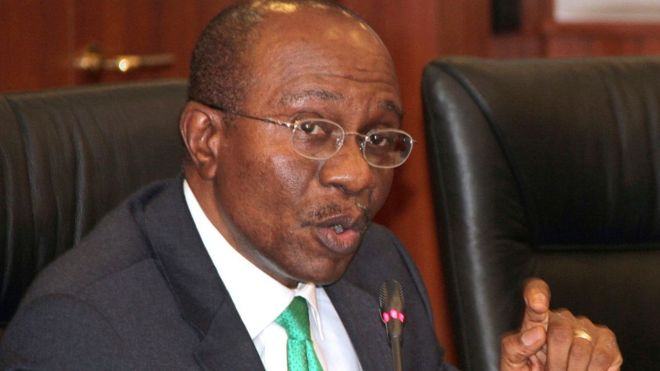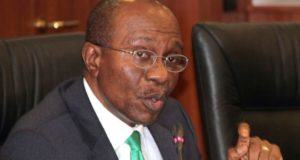
Godwin Emefiele
He recently revealed this at the 30th Anniversary Conference and Awards of the Finance Correspondents Association of Nigeria at Dover Hotel, Ikeja, Lagos.
According to him, the current level of infrastructure deficit in Nigeria is a major constraint to economic development, and that cannot be allowed to continue.
He added that with over 42 million MSMEs in Nigeria contributing 49.78 per cent to the nation’s GDP, 7.64 per cent of exports and employing 76.5 per cent of workforce, the sector is faced with numerous challenges that continue to limit the enterprises’ potential to contribute to economic growth and development.
His words, “In Nigeria, the current level of infrastructure deficit is a major constraint to economic development and attainment of growth average rate of at least five to seven per cent required to boost productivity and sustainable growth for businesses.”
“According to the World Development Indicators (2019), 56.20 per cent of Nigerians have access to electricity, while electric power consumption stood at 144.52 kWh per capita as of 2018.”
“While infrastructure deficit in Nigeria is estimated to be about 1.2 per cent of GDP, it is projected that the Federal Government needs to commit about US$100 billion annually to address the nation’s infrastructural deficit.”
“With over 42 million MSMEs in Nigeria contributing 49.78 per cent to the nation’s GDP, 7.64 per cent of exports and employing 76.5 per cent of workforce, the sector is faced with numerous challenges that continue to limit the enterprises’ potential to contribute to economic growth and development.”
“According to PwC, access to electricity accounts for the major share of costs to daily operations of MSMEs.”
“The energy sector is overwhelmed by a plethora of challenges ranging from operational inefficiencies to infrastructure deficiencies, which have resulted in inadequate electricity supply by households and businesses in Nigeria.”
“This has contributed significant economic costs to MSMEs, thus hampering their competitiveness and contribution to economic growth.”
![DJ Baddo – All Of Me Remix ft John Legend [AuDio]](https://www.naijavibe.net/wp-content/uploads/wordpress-popular-posts/94409-featured-40x40.jpg) DJ Baddo – All Of Me Remix ft John Legend [AuDio]
DJ Baddo – All Of Me Remix ft John Legend [AuDio] ![Mr. Charis - All Back ft Zouwrah [AuDio]](https://www.naijavibe.net/wp-content/uploads/wordpress-popular-posts/67331-featured-40x40.jpg) Mr. Charis – All Back ft Zouwrah [AuDio]
Mr. Charis – All Back ft Zouwrah [AuDio]  Dj Kamol – Crazy Gyration ft Skailey Normal [AuDio]
Dj Kamol – Crazy Gyration ft Skailey Normal [AuDio] ![Yung6ix – I Pray ft Oritse Femi [AuDio]](https://www.naijavibe.net/wp-content/uploads/wordpress-popular-posts/163012-featured-40x40.jpeg) Yung6ix – I Pray ft Oritse Femi [AuDio]
Yung6ix – I Pray ft Oritse Femi [AuDio] ![DJ Enimoney - Shaku Shaku Therapy [MixTape]](https://www.naijavibe.net/wp-content/uploads/wordpress-popular-posts/155494-featured-40x40.jpg) DJ Enimoney – Shaku Shaku Therapy [MixTape]
DJ Enimoney – Shaku Shaku Therapy [MixTape] ![Kolasoul - All Of Me [AuDio]](https://www.naijavibe.net/wp-content/uploads/wordpress-popular-posts/40876-featured-40x40.jpg) Kolasoul – All Of Me [AuDio]
Kolasoul – All Of Me [AuDio] ![Iyanya – Credit ft Don Jazzy [AuDio]](https://www.naijavibe.net/wp-content/uploads/wordpress-popular-posts/167713-featured-40x40.jpg) Iyanya – Credit ft Don Jazzy [AuDio]
Iyanya – Credit ft Don Jazzy [AuDio]  Victony, Don Toliver & Rema – Soweto
Victony, Don Toliver & Rema – Soweto ![Big C - Obimo ft Starface [AuDio]](https://www.naijavibe.net/wp-content/uploads/wordpress-popular-posts/19188-featured-40x40.jpeg) Big C – Obimo ft Starface [AuDio]
Big C – Obimo ft Starface [AuDio]  CKay – Emiliana
CKay – Emiliana  Da Ilegal – One Time
Da Ilegal – One Time ![Dj Sjs - Gospel Worship [MixTape]](https://www.naijavibe.net/wp-content/uploads/wordpress-popular-posts/164337-featured-40x40.jpg) Dj Sjs – Gospel Worship [MixTape]
Dj Sjs – Gospel Worship [MixTape]
 NaijaVibe NaijaVibe | Download Latest Nigerian Music & Mp3s
NaijaVibe NaijaVibe | Download Latest Nigerian Music & Mp3s


